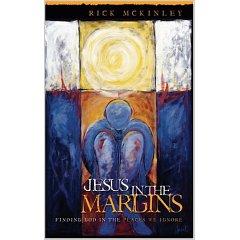Review: JESUS IN THE MARGINS
 I am particularly interested in how pastors are really ministering, really leading, really discipling, and really fulfilling their calling before the Lord in seeking to be real and relevant and meaningful in today's world. It's one thing to read some books and interact with conversations at Starbucks. But it's another to actually do ministry among needy and seeking and Christ-serving people. Jesus in the Margins (2005, Multnomah Publishers, Inc.) is a book that shares the thoughts of ministry that come from the pulpit and from the back alleys. Pastor Rick McKinley writes from the heart, not really trying to win an argument as much as looking to throw out his story for all to see, for better or for worse.
I am particularly interested in how pastors are really ministering, really leading, really discipling, and really fulfilling their calling before the Lord in seeking to be real and relevant and meaningful in today's world. It's one thing to read some books and interact with conversations at Starbucks. But it's another to actually do ministry among needy and seeking and Christ-serving people. Jesus in the Margins (2005, Multnomah Publishers, Inc.) is a book that shares the thoughts of ministry that come from the pulpit and from the back alleys. Pastor Rick McKinley writes from the heart, not really trying to win an argument as much as looking to throw out his story for all to see, for better or for worse.McKinley is Donald Miller's pastor at Imago Dei in Portland, OR. The community was "established for people to discover the love of Christ in the reality of life" (from back jacket), and it's this "reality of life" that comes through in his narrative here. "The love of Jesus doesn't come to make us fit into American culture; it's here to makes us fit into heaven. His love is here to complete us" (p. 38). Stepping in line with Rob Bell's Velvet Elvis, this pastor is simply telling anyone listening that it's time to be who we really are, be who we're really saved to be in Christ.
The truth is, all of us who have a relationship with God can do so only because:So much of Christendom thinks way too highly of itself, or the pendulum swings the other way and we debase ourselves in guilt and shame. But balancing the "forgiven" with the "still desperately needy" is what makes the Christian life something others want to be a part of. McKinley points out that Jesus ministered in the margins, going to people who were avoided by the religious elite, having dinner with them and not turning them away. And that's what we're to be about, living that balance with real people who are also fogiven, also desperately needy. Anything less is a lie and sells the gospel short.
1) God has forgiven us.
2) We're still desperately needy people.
(p. 48)
Where's the freedom in becoming child-like again (chapter eight)? What if home was more than a house, more a place of real relationships and love together (chapter 9)? What would it look like if we went to Jesus with our questions more than harping from the high ground of our doctrinal answers all the time (chapter 5)? Those are some of the ideas that get bounced here, and maybe it's summed in the way the community of believers grows together:
The picture of the church in the Bible is a messy one. Why? Because community is messy. The lies our culture wants us to buy into are not new. The church has struggled against them since its birth. The mess happens when people who are not like each other begin to do life together. We soon realize that community requires us to fall at Jesus' feet and beg Him for the love it takes to obey the "one another" commands. We find we often have to ask people to forgive us because we have not served and loved them the way Jesus wanted us to. (p. 162)Finding a place of comfort, a place for reality to be real and love to be loving - that's important as the church finds its place in this post-9/11, post-Katrina world. Instead of pointing fingers and laying blame, I see McKinley calling Christians to ask for forgiveness, to serve others in risky ways, and to be real in our own devotion to the Lord. In a good way.



2 Comments:
Good review, Rick. I read David Hansen's The Art of Pastoring (see link below) a few years ago and I think it has some similar themes. Keep up the great writing. Lyn at Thought Renewal
http://www.christianbook.com/Christian/Books/product?item_no=16690&netp_id=108330&event=ESRCN&item_code=WW
thanks, lyn - remind me again in a year when i'm thru my current list of "to read" :) - looks like a good book, though.
hmm - wonder if there are review copies available?
Post a Comment
<< Home